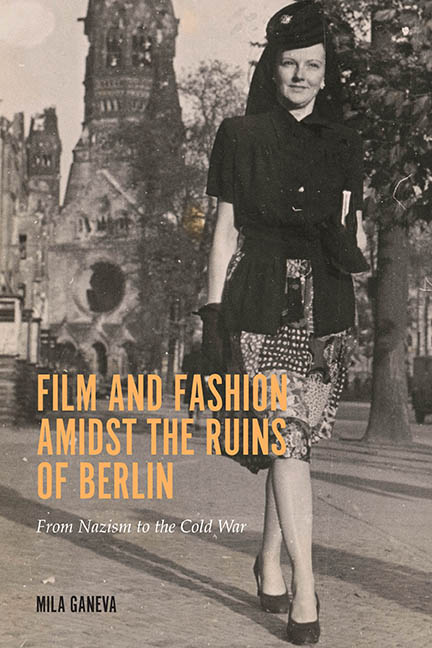Book contents
- Frontmatter
- Contents
- List of Illustrations
- Acknowledgments
- Introduction
- Chapter 1 Vicarious Consumption: Wartime Fashion in Film and the Press, 1939–44
- Chapter 2 “Fashions for Fräuleins”: The Rebirth of the Fashion Industry and Media in Berlin after 1945
- Vignette 1 Charlotte Glückstein: Historical Ruptures and Continuities in Postwar Fashion
- Chapter 3 Fashion amidst the Ruins: Revisiting Two Early Rubble Films,… und über uns der Himmel (1947) and Die Mörder sind unter uns (1946)
- Vignette 2 Hildegard Knef: Star Appeal from Fashion to Film
- Chapter 4 Farewell to the Rubble and Welcome to the New Look: Straßenbekanntschaft (1948) and Martina (1949)
- Chapter 5 Consuming Fashion on the Screens of the Early 1950s: Modell Bianka (1951), Frauenschicksale (1952), and Ingrid: Die Geschichte eines Fotomodells (1955)
- Epilogue
- Appendix 1 Principal Costume and Fashion Designers: Biographical Notes
- Appendix 2 Films and Newsreels Discussed
- Notes
- Bibliography
- Index
Appendix 1 - Principal Costume and Fashion Designers: Biographical Notes
Published online by Cambridge University Press: 28 July 2018
- Frontmatter
- Contents
- List of Illustrations
- Acknowledgments
- Introduction
- Chapter 1 Vicarious Consumption: Wartime Fashion in Film and the Press, 1939–44
- Chapter 2 “Fashions for Fräuleins”: The Rebirth of the Fashion Industry and Media in Berlin after 1945
- Vignette 1 Charlotte Glückstein: Historical Ruptures and Continuities in Postwar Fashion
- Chapter 3 Fashion amidst the Ruins: Revisiting Two Early Rubble Films,… und über uns der Himmel (1947) and Die Mörder sind unter uns (1946)
- Vignette 2 Hildegard Knef: Star Appeal from Fashion to Film
- Chapter 4 Farewell to the Rubble and Welcome to the New Look: Straßenbekanntschaft (1948) and Martina (1949)
- Chapter 5 Consuming Fashion on the Screens of the Early 1950s: Modell Bianka (1951), Frauenschicksale (1952), and Ingrid: Die Geschichte eines Fotomodells (1955)
- Epilogue
- Appendix 1 Principal Costume and Fashion Designers: Biographical Notes
- Appendix 2 Films and Newsreels Discussed
- Notes
- Bibliography
- Index
Summary
Bessie Becker (1919–71), listed in credits also as Irmgard Becker-Schulte or Irmgard Becker, spent her formative years in Berlin. From 1937 to 1940 she studied at the Fashion and Textile School on the Warsaw Bridge (Textil- und Modeschule an der Warschauer Brücke), initially fashion drawing (Modegraphik) and subsequently costume design. In the 1940s Becker worked as a costume designer for Berlin theaters as well as for UFA, where she provided the costumes for five wartime productions, including Großstadtmelodie (1943) and Meine Freundin Josefine (1942), two films with extensive scenes set in a fashion salon and around fashion shows. At the end of the war, in 1945, Becker moved to Munich, where she resumed work for both theater (Münchner Kammerspiele) and film. She is listed as the costume designer in the credits for thirteen West German film productions between 1947 and 1959. Among her most prominent works are: … und über uns der Himmel (1947), Zwischen gestern und morgen (1947), Film ohne Titel (1948), Das doppelte Lottchen (1950), and Nachts auf den Straßen (1952).
Irmgard Bibernell (1910–99) was born in Berlin and trained at the Lette-Verein. After working as an apprentice and star model at the famous Gerson Salon, Bibernell started her own independent career as a designer. In 1934 she cofounded with Heinz Schulze the fashion salon Schulze & Bibernell; after 1941 it became a member of Berliner Modelle GmbH and a well-known supplier of costumes for the stage and film. Bibernell was known as the personal couturier of movie celebrities such as Zarah Leander, Marika Rökk, and Inge Meysel. After 1945 she relocated to Hamburg and rebuilt her business with the help of her friend the publicist Axel Springer. She designed the costumes for the postwar productions Film ohne Titel (1948; working with Bessie Becker) and In jenen Tagen (1947).
Alfred Bü cken (1910–?) designed the costumes for twelve UFA period dramas between 1939 and 1945 (Der Tanz mit dem Kaiser, Diesel, Träumerei) and for twenty West German productions between 1950 and 1959. Bücken's extensive personal archive, including many sketches, is available in the Filmmuseum Frankfurt.
- Type
- Chapter
- Information
- Film and Fashion amidst the Ruins of BerlinFrom Nazism to the Cold War, pp. 179 - 184Publisher: Boydell & BrewerPrint publication year: 2018



